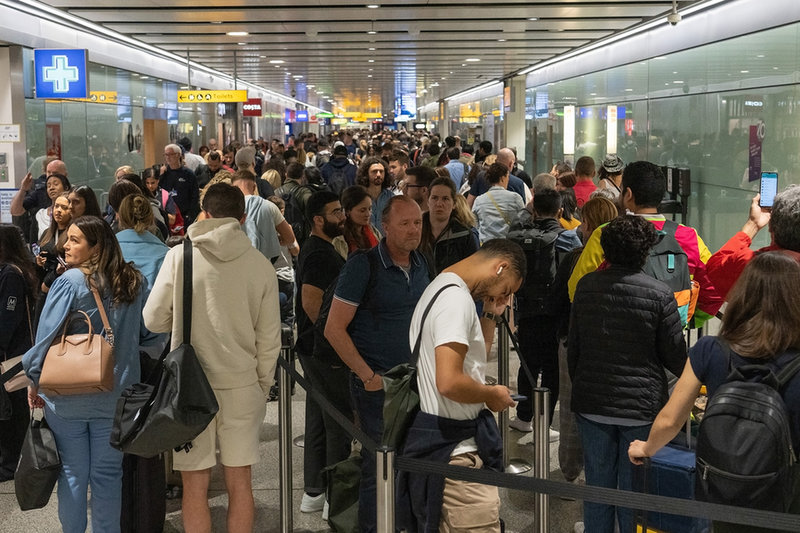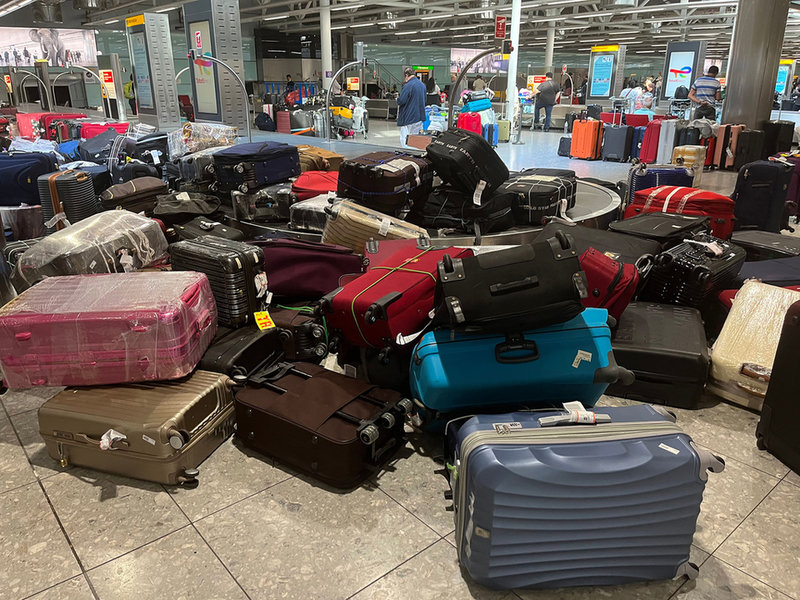workforce
Understaffed airlines and oversold flights lead to cancellation chaos
Jasleen Mann looks at how understaffing and overselling have contributed to a chaotic summer for air travel across the UK – and the measures that the British Government has taken in response.
Image: copyright
I
n anticipation of a post-Covid-19 rise in travel, airlines significantly increased flight schedules this summer. With pandemic-related travel restrictions easing globally and one of the hottest summers recorded on record across Europe, the aviation industry has experienced a significant increase in people expecting to travel in 2022.
But it has become apparent that airlines did not have the capacity to run all of the flights scheduled for these passengers.
Thousands of flights have been cancelled and it is expected that airlines such as Wizz Air, Delta, and easyJet will reassess their schedules this year to counteract the scheduling issues and staff shortages. However, airlines such as Emirates have also refused to reduce the number of scheduled flights.
22 steps towards a solution
“It is understandable why airlines rapidly increased their Spring/Summer schedules for 2022, as vaccination programmes displayed strong progress in many key markets for the travel industry, resulting in booking confidence increasing in 2021,” comments Ralph Hollister, travel and tourism analyst at GlobalData.
“However, many airlines have found it difficult to hire, vet, and train new staff members to meet the unforeseen demand for international flights from travellers and are now having to cancel hundreds of flights.”
In 2021, there was a lack of hiring activity and this has had an impact on hiring pressures and the number of staff available at airports.
Many airlines have found it difficult to hire, vet, and train new staff members.
The UK Government announced a 22-point plan to get a hold on disruption in the aviation industry at the end of June, with the aim of tackling the disruption that the sector has endured. The plan was developed in response to the issues during Easter and half-term at UK airports, a period of peak travel for UK families.
In a statement at the time of the time, Transport Secretary Grant Shapps said: “Passengers deserve reliable services, and to be properly compensated if things don’t go to plan, and the chaotic scenes we’ve seen at airports are unacceptable.”
The 22-point plan addresses the importance of recruiting and training staff – announcing the launch of several initiatives to help with career awareness, skills training, and career progression; ensuring that the industry delivers on realistic summer schedules by working in cooperation with the UK Civil Aviation Authority (CAA); and supports passengers when delays and cancellations take place by both reaffirming airlines’ responsibilities and liabilities as well as reviewing the current practices in place and assessing plans for additional measures.

Travellers wait in a long queue to pass through the security check at Heathrow on 1 June 2022 in London, UK.
Credit: Carl Court/Getty Images
Lowering barriers for the next generation
London Heathrow Airport in the UK suggested the airport experienced 40 years of traffic growth in just four months. Heathrow airport noted staff shortages resulting in baggage delays, long queues, and delays for those with mobility issues.
Passengers were asked not to arrive at the airport more than three hours before their flights. In addition, Heathrow announced it would restrict passenger traffic numbers to 100,000 from 12 July to 11 September.
Due to the increasing demand experienced this summer, the UK Government also reduced the amount of time required for new airport employees to pass mandatory national security checks.
Timelines relating to the onboarding of staff was reduced while also maintaining security standards. This suggests more flexibility in relation to background checks; employers would be able to use a HM Revenue and Customs letter to verify five years of employment checks.

Suitcases are seen uncollected at Heathrow's Terminal Three bagage reclaim on 8 July 2022.
Credit: PAUL ELLIS/AFP/Getty Images
As part of the 22 point plan, the UK Government announced £1.5m investment into recruitment in the sector, including a £700,000 ‘Reach for the Sky Challenge Fund’ aimed to help young people into a career in aviation.
At the launch of the fund, UK Aviation Minister Robert Courts said: “We’re all aware of the difficulties being experienced in the aviation industry at the moment. While measures such as our airport slots amnesty are having an immediate, positive impact, it’s absolutely vital that we also focus on making the industry more sustainable in the longer term.
“A resilient workforce is at the heart of that and is a core part of our 22-point plan to help the sector minimise disruption this summer.”
Slot amnesty
The situation also resulted in airport slot rules being introduced to ensure airlines were able to plan ahead and avoid cancellations. However, this is a temporary solution while further airport staff hires are made.
The slots are essentially parking spaces for aircraft and include access to the runway, terminal, and gates at specific dates and times. Airlines have a short amount of time before they have to hand back slots this summer, if they are aware that they will not be able to operate. This ensures passengers are kept up to date and can make other arrangements.
These actions will help the sector to be more resilient in dealing with strong consumer demand.
“We share government’s ambitions for resolving the travel issues that we’ve seen in previous months. These actions will help the sector to be more resilient in dealing with strong consumer demand,” according to CAA CEO Richard Moriarty.
The number of measures being taken to tackle disruption demonstrate the seriousness of the flight cancellation situation this summer and the willingness government and industry bodies to find a solution for the future.
“We will work alongside government and the wider industry to help deliver a better experience for passengers,” continues Moriarty. “I’m looking forward to the CAA being part of that collective effort.”
Main image: Travellers wait in a long queue to pass through the security check at Heathrow on 1 June 1 2022 in London, UK. The aviation industry is struggling to recruit staff after layoffs during the Covid-19 pandemic. Credit: Carl Court/Getty Images